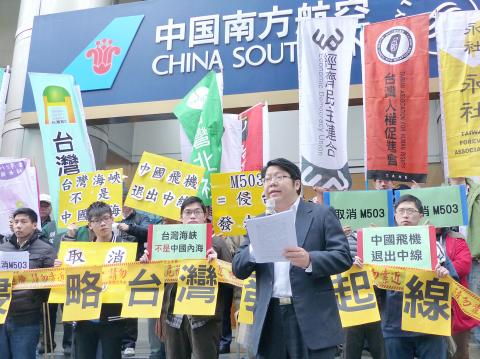More than 100 demonstrators yesterday sang in unison outside the Taipei office of China Southern Airlines to express their opposition to controversial flight routes proposed by Beijing.
Headed by a coalition of social advocacy organizations and pro-independence groups, the protesters demanded that China cancel its plans for flight route M503, which runs close to the median line of the Taiwan Strait.
They said that the proposed route reflected China’s ambitions to encroach on Taiwanese airspace and posed a threat to national security.

Photo: Hsiao Ting-fang, Taipei Times
The groups accused President Ma Ying-jeou’s (馬英九) administration of failing to stand its ground in negotiations with Beijing.
While China originally planned for the new route to take effect today, the Civil Aeronautics Administration (CAA) on Monday said that China has agreed to postpone use of the route.
The CAA also cited an agreement with China that the proposed route would be moved 6 nautical miles (11km) west of its original location.
Premier Mao Chi-kuo (毛治國) on Tuesday said that although he thinks the route should have been moved even further to the west, he considers the adjustment “acceptable.”
Mao’s comments drew criticism from opposition legislators and civic groups alike, who said that the government had failed to safeguard the nation’s sovereignty.
Human rights lawyer Lai Chung-chiang (賴中強) said that civilian flight routes in China are congested as a result of large swathes of airspace being restricted to military use, adding that many areas along the Chinese coast are designated as “war preparation zones” in mind of a potential invasion of Taiwan.
“This is not a problem caused by Taiwan, but rather a problem caused by the People’s Liberation Army,” Lai said.
Lai said that the rally was inspired by Estonia’s “Singing Revolution” in the late 1980s, in which groups of protesters drew strength from choral music as they shouted out their defiance against the Soviet regime.
In Taipei, protesters sang several songs that featured prominently in past social movements, including Ilha Formosa (美麗島) — which was widely sung during anti-authoritarian rallies in the late 1970s — as well as other songs of political significance, such as 2008 power ballad Turning the Tide (逆轉勝) and last year’s Island Sunrise (島嶼天光).
Island Sunrise, written by Kaohsiung-based punk band Fire-EX, was the unofficial anthem of the Sunflower movement, in which tens of thousands of protesters took part in a massive choir to protest the government’s handling of a proposed trade pact with China.
The groups announced further protests leading up to the Boao Forum for Asia, a China-led economic conference scheduled to take place from March 26 to March 29 in China’s Hainan Province.
“Like the Baltic states that held faith in their struggle for independence from the Soviet Union, we should also persist until the end,” Lai said.

A strong continental cold air mass is to bring pollutants to Taiwan from tomorrow, the Ministry of Environment said today, as it issued an “orange” air quality alert for most of the country. All of Taiwan except for Hualien and Taitung counties is to be under an “orange” air quality alert tomorrow, indicating air quality that is unhealthy for sensitive groups. In China, areas from Shandong to Shanghai have been enveloped in haze since Saturday, the ministry said in a news release. Yesterday, hourly concentrations of PM2.5 in these areas ranged from 65 to 160 micrograms per cubic meter (mg/m³), and pollutants were

Taiwan’s armed forces have established response protocols for a wide range of sudden contingencies, including the “Wan Chun Plan” to protect the head of state, the Ministry of Defense (MND) said today. After US President Donald Trump on Saturday launched a series of airstrikes in Venezuela and kidnapped Venezuelan President Nicolas Maduro, concerns have been raised as to whether China would launch a similar “decapitation strike” on Taiwan. The armed forces regularly coordinate with relevant agencies and practice drills to ensure preparedness for a wide range of scenarios, Vice Minister of National Defense Hsu Szu-chien (徐斯儉) told reporters before a

EVA Airways on Saturday said that it had suspended a pilot and opened an investigation after he allegedly lost his temper and punched the first officer several times as their plane was taxiing before takeoff at Los Angeles International Airport. According to a report published on Thursday by The Reporter, the incident occurred after the flight’s Malaysian first officer tried to warn the Taiwanese pilot, surnamed Wen (文), that he was taxiing faster than the speed limit of 30 knots (55.6kph). After alerting the pilot several times without response, the first officer manually applied the brakes in accordance with standard operating

Japanese Councilor Hei Seki (石平) on Wednesday said that he plans to visit Taiwan, saying that would “prove that Taiwan is an independent country and does not belong to China.” Seki, a member of the Japan Innovation Party, was born in Chengdu in China’s Sichuan Province and became a naturalized Japanese in 2007. He was elected to the House of Concilors last year. His views on the Chinese Communist Party (CCP) — espoused in a series of books on politics and history — prompted Beijing to sanction him, including barring Seki from traveling to China. Seki wrote on X that he intends